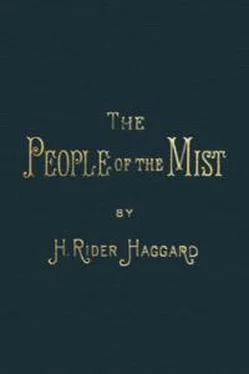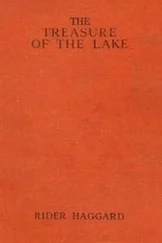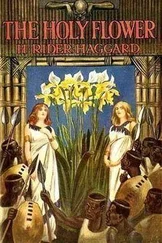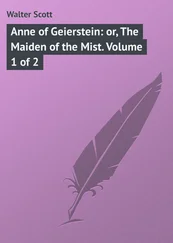"The will which I am to sign to–morrow will prove to you if you are yet alive, as I believe to be the case, how deep is my anxiety that that you should re–enter into possession of the ancestral home of which fortune has deprived you. It is with the greatest pleasure that I make you this bequest, and I can do so with a clear conscience, for my late husband has left everything at my absolute disposal—being himself without near relations—in the sad event which has occurred, of the death of his daughter, our only child.
"May you live long enough to enjoy the lands and fortune which I am enabled thus to return to your family, and may your children and their descendants sit at Outram for many a generation to come!
"And now I will talk no more of this matter, for I have an explanation to make and a pardon to ask.
"It may well be, Leonard, that when your eyes fall upon these lines, you will have forgotten me—most deservedly—and have found some other woman to love you. No, as I set this down I feel that it is not true; you will never forget me altogether, Leonard—your first love—and no other woman will ever be quite the same to you as I have been; or, at least, so I believe in my foolishness and vanity.
"You will ask what explanation is possible after the way in which I have treated you, and the outrage that I have done to my own love. Such as it is, however, I offer it to you.
"I was driven into this marriage, Leonard, by my late father, who could be very cruel when he chose. To admit this is, as I know, a proof of weakness. So be it, I have never concealed from myself that I am weak. Yet, believe me, I struggled while I could; I wrote to you even, but they intercepted my letter; and I told all the truth to Mr. Cohen, but he was self–willed and passionate, and would take no heed of my pleading. So I married him, Leonard, and was fairly happy with him, for he was kindness itself to me, but from that hour I began to die.
"And now more than six years have passed since the night of our parting in the snow, and the end is at hand, for I am really dying. It has pleased God to take my little daughter, and this last shock proved more than I can bear, and so I go to join her and to wait with her till such time as I shall once more see your unforgotten face.
"That is all that I have to say, dear Leonard.
"Pardon me, and I am selfish enough to add—do not forget me.
"JANE.
"P.S.—Why is it that an affection like ours, which has never borne fruit even, should in the end prove stronger than any other earthly tie? Heaven knows, and Heaven alone, how passionately I loved and love my dead child; and yet, now that my own hour is at hand, it is of you that I think the most, you who are neither child nor husband. I suppose that I shall understand ere long, but, O Leonard, Leonard, Leonard, if, as I believe, my nature is immortal, I swear that such love as mine for you, however much it be dishonoured and betrayed, is still the most immortal part of it!—J."
Leonard put down the letter on the table, and again he covered his face with his hand to hide his emotion, for his feelings overcame him as a sense of the depth and purity of this dead woman's undying love sank into his heart.
"May I read that letter, Leonard?" asked Juanna in a quiet voice.
"Yes, I suppose so, dear, if you like," he answered, feeling dully that it was better to make a clean breast of the matter at once, and thus to prevent future misunderstandings.
Juanna took the letter and perused it twice, by which time she knew it as well as she did the Lord's Prayer, nor did she ever forget a single word of it. Then she handed it back to the lawyer, saying nothing.
"I understand," said Mr. Turner, breaking in on a silence which he felt to be painful, "that you will be able to produce the necessary proofs of identity within the next few days, and then we can get the will proved in the usual form. Meanwhile, you must want money, which I will take the risk of advancing you," and he wrote a cheque for a hundred pounds and gave it to Leonard.
Half an hour later Leonard and Juanna were alone in a room at their hotel, but as yet scarcely a word had passed between them since they left the lawyer's office.
"Don't you see, Leonard," his wife said almost fiercely, "it is most amusing, you made a mistake. Your brother's dying prophecy was like a Delphic oracle—it could be taken two ways, and, of course, you adopted the wrong interpretation. You left Grave Mountain a day too soon. It was by Jane Beach's help that you were to recover Outram, not by mine," and she laughed sadly.
"Don't talk like that, dear," said Leonard in a sad voice; "it pains me."
"How else am I to talk after reading that letter?" she answered, "for what woman can hold her own against a dead rival? Now also I must be indebted to her bounty all my days. Oh! if I had not lost the jewels—if only I had not lost the jewels!"
History does not relate how Leonard dealt with this unexpected and yet natural situation.
A week had passed and Leonard, with Juanna at his side, found himself once more in the great hall at Outram, where, on a bygone night, many years ago, he and his dead brother had sworn their oath. All was the same, for in this hall nothing had been changed—Jane had seen to that. There chained to its stand was the Bible, upon which they had registered their vow; there were the pictures of his ancestors gazing down calmly upon him, as though they cared little for the story of his struggles and of his strange triumph over fortune "by the help of a woman." There was the painted window, with its blazoned coats of arms and its proud mottoes—" For Heart, Home, and Honour ," and " Per ardua ad astra ." He had won the heart and home, and he had kept his honour and his oath. He had endured the toils and dangers and the crown of stars was his.
And yet, was Leonard altogether happy as he stood looking on these familiar things? Perhaps not quite, for yonder in the churchyard there was a grave, and within the church a monument in white marble, that was wonderfully like one who had loved him and whom he had loved, though time and trouble had written a strange difference on her face. Also, he had failed: he had kept his oath indeed and fought on till the end was won, but himself he had not won it. What now was his had once belonged to his successful rival, who doubtless little dreamed of the payment that would be exacted from him by the decree of fate.
And was Juanna happy? She knew well that Leonard loved her truly; but oh! it was cruel that she who had shared the struggles should be deprived of her reward—that it should be left to another, who if not false had at least been weak, to give to her husband that which she had striven so hard to win—that which she had won—and lost. And harder still was it that in this ancient place which would henceforth be her home, by day and by night she must feel the presence of the shadow of a woman, a woman sweet and pale, who, as she believed, stood between her and that which she desired above all things—the complete and absolute possession of her husband's heart.
Doubtless she overrated the trouble; men and women do not spend their lives in brooding upon the memories of their first loves—if they did, this would be a melancholy world. But to Juanna it was real enough, and remained so for some years. And if a thing is true to the heart, it avails little that reason should give it the lie.
In short, now in the hour of their full property, Leonard and Juanna were making acquaintance with the fact that fortune never gives with both hands, as the French say, but loves to rob with one while she bestows with the other. To few is it allowed to be completely miserable, to none to be completely happy. Their good luck had been so overwhelming in many ways, that it would have partaken of the unnatural, and might well have excited their fears for the future, had its completeness been unmarred by these drawbacks which, such as they were, probably they learned to disremember as the years passed over them bringing them new trials and added blessings.
Читать дальше












